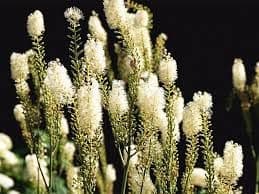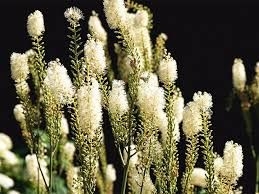

Common Name
Black Cohosh,
Black Bugbane,
Fairy Candle,
Rattle Root,
Snakeroot
Family
Ranunculaceae
Parts Used
Root, rhizome
Native To
Native to North America, particularly in the eastern United States and Canada, thriving in woodland environments.
Historical and Traditional Uses:
- Native American Uses: Traditionally used by Native Americans for menstrual and menopausal issues, rheumatic pain, and as a remedy for snake bites.
- Colonial Use: Early settlers adopted its use for similar gynecological and inflammatory conditions.
- Folk Medicine: Known for alleviating symptoms of menopause, PMS, and other hormonal disorders, as well as being a sedative and anti-inflammatory agent.
Chemical Composition:
- Triterpene Glycosides: Actein, cimicifugoside
- Phenolic Compounds: Ferulic acid, isoferulic acid
- Flavonoids: Kaempferol derivatives
- Alkaloids: N-methylcytisine
- Other: Resin, tannins, and starch
Pharmacological Properties:
- Estrogenic-like Activity: Modulates estrogen receptors without direct hormonal effects.
- Anti-inflammatory: Inhibits pro-inflammatory mediators.
- Antioxidant: Neutralizes free radicals.
- Sedative Effects: Calms the central nervous system.
Evidence-Based Uses and Benefits:
- Menopausal Symptom Relief:
- Evidence: Studies indicate efficacy in reducing hot flashes, night sweats, and mood swings.
- Key Study: Mehrpooya et al., 2018 found black cohosh effective for menopausal vasomotor symptoms
- PMS and Menstrual Cramps:
- Mechanism: Reduces cramping and regulates mood.
- Supporting Study: Kronenberg & Fugh-Berman, 2002
- Bone Health:
- Evidence: May prevent bone loss in postmenopausal women.
- Anxiety and Depression:
- Use: Mild sedative properties beneficial in mood regulation.
- Clinical Insight: Supporting data from Cochrane Database reviews.
Counter-Indications:
- Pregnancy and breastfeeding (potential hormonal effects).
- Hormone-sensitive conditions such as uterine cancer.
- Liver disorders (rare hepatotoxicity reported).
Side Effects:
- Mild gastrointestinal upset (nausea, diarrhea).
- Headache or dizziness in rare cases.
- Possible liver toxicity with prolonged use (monitor liver enzymes).
Drug Interactions:
- Hormonal Therapies: May enhance or interfere with hormone replacement therapy or contraceptives.
- Sedatives: Potentiates CNS depressants like benzodiazepines.
- Hepatotoxic Drugs: Increased risk of liver damage when combined with drugs like acetaminophen or alcohol.
Research and White Papers with Links:
-
Menopausal Symptoms: Comparative efficacy of black cohosh with hormonal therapy
(https://pmc.ncbi.nlm.nih.gov/articles/PMC6599854/#:~:text=There%20was%20no%20significant%20difference,in%20menopausal%20symptom%20scores%20(standardised)) -
Bone Health: Effects on bone health.)
-
Liver Safety: Hepatotoxicity associated with herbal remedies
-
Effectiveness and safety of the treatment of menopausal syndrome:(http://www.ncbi.nlm.nih.gov/pubmed/17219796)
-
A review of the effectiveness of Cimicifuga racemosa (black cohosh) for the symptoms of menopause:(http://www.ncbi.nlm.nih.gov/pubmed/9650153)
-
A systematic review of the safety of black cohosh:(http://www.ncbi.nlm.nih.gov/pubmed/12544678)
-
black cohosh does not increase mammographic breast density or breast cell proliferation in postmenopausal women:(http://www.ncbi.nlm.nih.gov/pubmed/17019374)
-
Review of the clinical data for safety and efficacy in menopausal symptoms:(http://www.ncbi.nlm.nih.gov/pubmed/15898823)
Conclusion:
Black cohosh is a promising herbal remedy for managing menopausal and gynecological conditions. Its unique non-hormonal estrogenic activity, anti-inflammatory properties, and sedative effects make it particularly beneficial for women experiencing menopause or PMS. However, its use requires caution due to potential liver toxicity and interactions with other medications.
Related Articles

Navigating Sexual Wellness and Maintaining Intimacy During Menopause: Steps for Both Partners
7 minsRead
Check Out: Five Indian Sexual Health Accounts You Should Be Following On Instagram If You Aren’t Already
5 minsRead
Candid Conversations: 5 Women share their chosen menstrual product and its reasons! |
3 minsRead